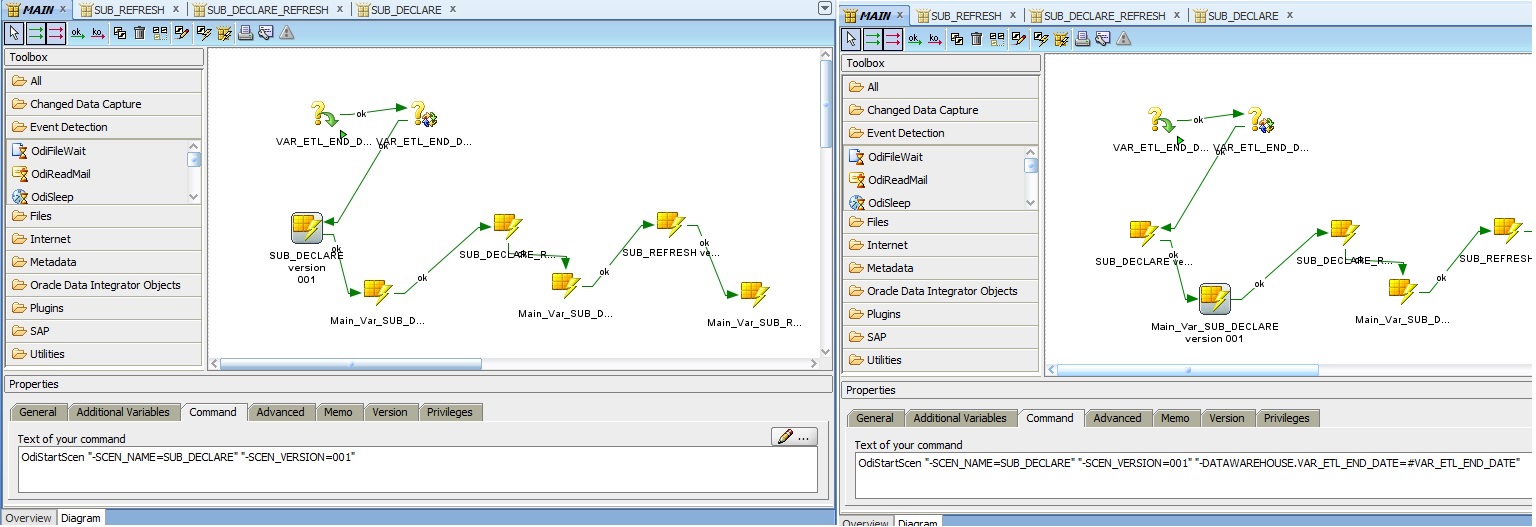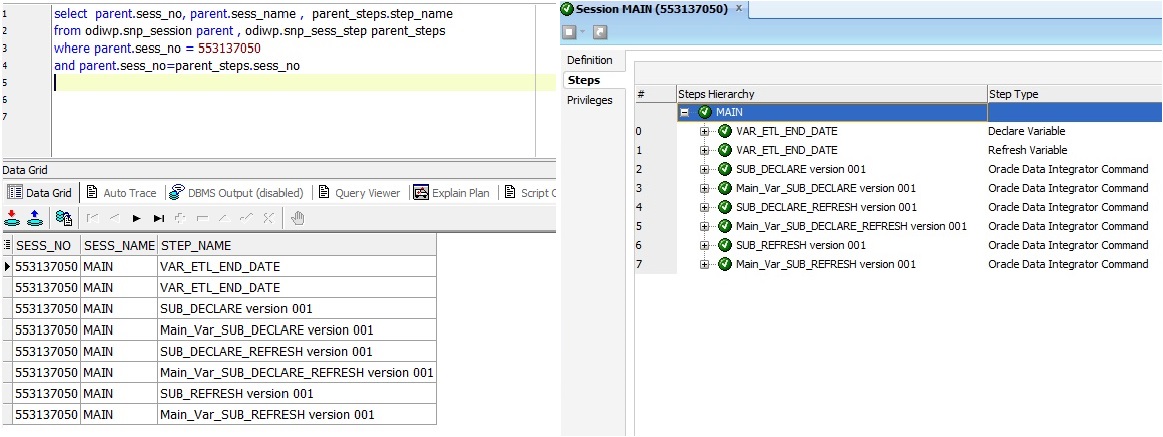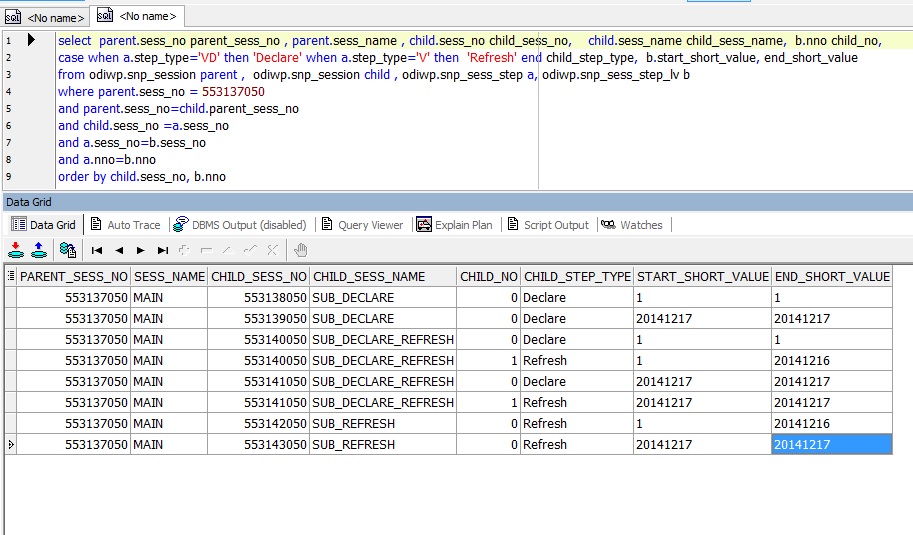December 13, 2011
by kdevendr
3 Comments
Categories: How to , Java Codes , ODI , SDK , SQL
Tags: Interface , MINUS , ODI , ODI SDK , Operator , SDK , UNION

Howdy guys!
Keeping the Java series, here is more one Java Code for ODI.
The below codes is used to create an Interface that can create Multiple Dataset depending on the source
datastore and Operator provided.
For example – Here
String[] source_datastore={“REGIONS”,”REGIONS”,”REGIONS”};
we are using three different source tables ,you can change them and provide any number of Source datastore in the array and accordingly n number of the Dataset are created.
String[] operator={“UNION”,”MINUS”};
For n number of the source database , n-1 number of the Operator needs to be provided.
For example if there are 4 different source datastore , then 3 operator need to provided which can be same or different depending on your requirement.
package odi.sdk;
import java.util.Collection;
import java.util.Iterator;
import oracle.odi.core.OdiInstance;
import oracle.odi.core.config.MasterRepositoryDbInfo;
import oracle.odi.core.config.OdiInstanceConfig;
import oracle.odi.core.config.PoolingAttributes;
import oracle.odi.core.config.WorkRepositoryDbInfo;
import oracle.odi.core.exception.OdiRuntimeException;
import oracle.odi.core.persistence.transaction.ITransactionStatus;
import oracle.odi.core.persistence.transaction.support.DefaultTransactionDefinition;
import oracle.odi.core.security.Authentication;
import oracle.odi.domain.model.OdiDataStore;
import oracle.odi.domain.model.finder.IOdiDataStoreFinder;
import oracle.odi.domain.project.OdiCKM;
import oracle.odi.domain.project.OdiFolder;
import oracle.odi.domain.project.OdiIKM;
import oracle.odi.domain.project.OdiInterface;
import oracle.odi.domain.project.OdiLKM;
import oracle.odi.domain.project.ProcedureOption;
import oracle.odi.domain.project.finder.IOdiCKMFinder;
import oracle.odi.domain.project.finder.IOdiFolderFinder;
import oracle.odi.domain.project.finder.IOdiIKMFinder;
import oracle.odi.domain.project.finder.IOdiLKMFinder;
import oracle.odi.domain.project.interfaces.DataSet;
import oracle.odi.domain.project.interfaces.SourceDataStore;
import oracle.odi.domain.project.interfaces.SourceSet;
import oracle.odi.domain.topology.OdiContext;
import oracle.odi.domain.topology.finder.IOdiContextFinder;
import oracle.odi.interfaces.interactive.support.InteractiveInterfaceHelperWithActions;
import oracle.odi.interfaces.interactive.support.actions.InterfaceActionOnTargetDataStoreComputeAutoMapping;
import oracle.odi.interfaces.interactive.support.actions.InterfaceActionSetKM;
import oracle.odi.interfaces.interactive.support.actions.InterfaceActionSetKM.KMType;
import oracle.odi.interfaces.interactive.support.actions.InterfaceActionSetKMOptionValue;
import oracle.odi.interfaces.interactive.support.actions.InterfaceActionSetTargetDataStore;
import oracle.odi.interfaces.interactive.support.km.optionretainer.KMOptionRetainerHomonymy;
import oracle.odi.interfaces.interactive.support.km.optionretainer.KMOptionRetainerLazy;
import oracle.odi.interfaces.interactive.support.mapping.automap.AutoMappingComputerLazy;
import oracle.odi.interfaces.interactive.support.mapping.matchpolicy.MappingMatchPolicyLazy;
import oracle.odi.interfaces.interactive.support.sourceset.creators.InexistentMappingException;
import oracle.odi.interfaces.interactive.support.targetkeychoosers.TargetKeyChooserPrimaryKey;
public class PermanentInterfaceWithUnion {
private static String Project_Code;
private static String Folder_Name;
private static OdiFolder folder;
private static String Context_Code;
private static OdiContext context;
private static OdiDataStore sourceDatastore;
private static String target_model_name;
private static String source_model_name;
private static String LKM;
private static String IKM;
private static String CKM;
private static String target_datastore;
private static SourceSet srcset;
private static SourceDataStore sd;
private static DataSet dataset;
/**
* @param args
*/
public static void main(String[] args) {
/****** Please change these Parameters *********/
String Url = "jdbc:oracle:thin:@localhost:1521:xe";
String Driver="oracle.jdbc.OracleDriver";
String Master_User="ODI_MASTER_11G";
String Master_Pass="ODI_MASTER_11G";
String WorkRep="WORKREP1";
String Odi_User="SUPERVISOR";
String Odi_Pass="SUNOPSIS";
Project_Code="XMT";
Context_Code="XMT";
Folder_Name="FOLDER";
source_model_name = "SRCE_HR";
String[] source_datastore={"REGIONS","REGIONS","REGIONS"};
String[] operator={"UNION","MINUS"};
target_model_name = "TRGT_HR";
target_datastore="REGIONS";
LKM ="LKM SQL to Oracle";
IKM ="IKM SQL Control Append";
CKM ="CKM Oracle";
/*****************************/
// Connection
MasterRepositoryDbInfo masterInfo = new MasterRepositoryDbInfo(Url, Driver, Master_User,Master_Pass.toCharArray(), new PoolingAttributes());
WorkRepositoryDbInfo workInfo = new WorkRepositoryDbInfo(WorkRep, new PoolingAttributes());
OdiInstance odiInstance=OdiInstance.createInstance(new OdiInstanceConfig(masterInfo,workInfo));
Authentication auth = odiInstance.getSecurityManager().createAuthentication(Odi_User,Odi_Pass.toCharArray());
odiInstance.getSecurityManager().setCurrentThreadAuthentication(auth);
ITransactionStatus trans = odiInstance.getTransactionManager().getTransaction(new DefaultTransactionDefinition());
// Find the folder
Collection<OdiFolder> fold = ((IOdiFolderFinder) odiInstance.getTransactionalEntityManager().getFinder(OdiFolder.class)).findByName(Folder_Name);
for (Iterator<OdiFolder> it = fold.iterator(); it.hasNext();) {
folder = (OdiFolder) it.next();
}
// Find the Context
context = ((IOdiContextFinder) odiInstance.getTransactionalEntityManager().getFinder(OdiContext.class)).findByCode(Context_Code);
OdiDataStore targetDatastore = ((IOdiDataStoreFinder)odiInstance.getTransactionalEntityManager().
getFinder(OdiDataStore.class)).findByName(target_datastore, target_model_name);
System.out.println("Interface Creation Started for ..."+ target_datastore);
// Creating a New Interface
OdiInterface intf = new OdiInterface(folder, target_datastore, context);
// Setting the above Context as the Optimization Context
intf.setOptimizationContext(context);
// Reading the Source Data Store
// Find the Data store using the IOdiDataStoreFinder
int order=0;
for (int i=0 ;i<source_datastore.length ;i++) {
sourceDatastore = ((IOdiDataStoreFinder) odiInstance.getTransactionalEntityManager().getFinder(OdiDataStore.class)).
findByName(source_datastore[i], source_model_name);
// Creating DataSet to automatically assign different
// Source Data store
// DataSet(OdiInterface pInterface, java.lang.String pName)
if (i == 0) {
dataset = intf.getDataSets().iterator().next();
dataset.setName("DATASET"+i);
} else {
dataset=new DataSet(intf,"DATASET"+i);
dataset.setOperator(operator[i-1]);
dataset.setOrder(order);
}
srcset = new SourceSet("SrcSet01",dataset);
sd=new SourceDataStore(dataset,false,sourceDatastore.getName().toString(),0,sourceDatastore);
srcset.addSourceDataStore(sd);
dataset.addSourceSet(srcset);
order+=10;
}
// Helper is to manipulate Odi interfaces in an
// interactive way
InteractiveInterfaceHelperWithActions helper = new InteractiveInterfaceHelperWithActions
(intf, odiInstance, odiInstance.getTransactionalEntityManager());
helper.performAction(new InterfaceActionSetTargetDataStore(
targetDatastore, new MappingMatchPolicyLazy(),
new AutoMappingComputerLazy(),
new AutoMappingComputerLazy(),
new TargetKeyChooserPrimaryKey()));
helper.performAction(new InterfaceActionOnTargetDataStoreComputeAutoMapping());
// Add the Filter
//helper.performAction(new InterfaceActionAddFilter(dataset, sd.getName(),ExecutionLocation.WORK));
// Start mapping the KM
// LKM
Collection<OdiLKM> lkm1 = ((IOdiLKMFinder) odiInstance.getTransactionalEntityManager().getFinder(OdiLKM.class)).findByName(
LKM,Project_Code);
for (Iterator<OdiLKM> iterator = lkm1.iterator(); iterator.hasNext();) {
OdiLKM odiLKM = (OdiLKM) iterator.next();
helper.performAction(new InterfaceActionSetKM(odiLKM,srcset, KMType.LKM,new KMOptionRetainerHomonymy()));
// Fetching each option of the LKM
for (ProcedureOption c : odiLKM.getOptions()) {
helper.performAction(new InterfaceActionSetKMOptionValue(srcset, KMType.LKM,"DELETE_TEMPORARY_INDEXES", true));
}
}
// IKM
// Find the IKM using the IOdiIKMFinder
Collection<OdiIKM> ikm1 = ((IOdiIKMFinder) odiInstance.getTransactionalEntityManager().getFinder(OdiIKM.class)).findByName(
IKM,Project_Code);
for (Iterator<OdiIKM> iterator = ikm1.iterator(); iterator.hasNext();) {
OdiIKM odiIKM = (OdiIKM) iterator.next();
// Setting the IKM in the interface
helper.performAction(new InterfaceActionSetKM(odiIKM, intf.getTargetDataStore(),KMType.IKM, new KMOptionRetainerLazy()));
// Fetching each option of the IKM
for (ProcedureOption c : odiIKM.getOptions()) {
// Modifying the Options of the IKM in the
// Interface
helper.performAction(new InterfaceActionSetKMOptionValue(intf.getTargetDataStore(), KMType.IKM,
"FLOW_CONTROL", false));
helper.performAction(new InterfaceActionSetKMOptionValue(intf.getTargetDataStore(), KMType.IKM,
"STATIC_CONTROL", true));
}
}
// CKM
Collection<OdiCKM> ckm1 = ((IOdiCKMFinder) odiInstance.getTransactionalEntityManager().getFinder(OdiCKM.class)).findByName(
CKM,Project_Code);
for (Iterator<OdiCKM> iterator = ckm1.iterator(); iterator.hasNext();) {
OdiCKM odiCKM = (OdiCKM) iterator.next();
helper.performAction(new InterfaceActionSetKM(odiCKM, intf.getTargetDataStore(),KMType.CKM, new KMOptionRetainerLazy()));
}
// Compute the Interface sourceset
try {helper.computeSourceSets();}
catch (InexistentMappingException e) {throw new OdiRuntimeException(e);}
// Persisting the Interface
// Called to inform the ODI persistence layer that this
// interface will be persisted
try {helper.preparePersist();}
catch (oracle.odi.interfaces.interactive.exceptions.OdiInterfaceNotReadyForPersistException e) {e.printStackTrace();}
odiInstance.getTransactionalEntityManager().persist(intf);
/*// Generating Scenarios
System.out.println("Generating Scenario for .."+ target_datastore );
IOdiScenarioGenerator gene = new OdiScenarioGeneratorImpl(odiInstance);
OdiScenario newScen = gene.generateScenario(intf,target_datastore, "001");
odiInstance.getTransactionalEntityManager().persist(newScen);*/
// Finally close the Instance
odiInstance.getTransactionManager().commit(trans);
odiInstance.close();
System.out.println("Process Completed");
}
}
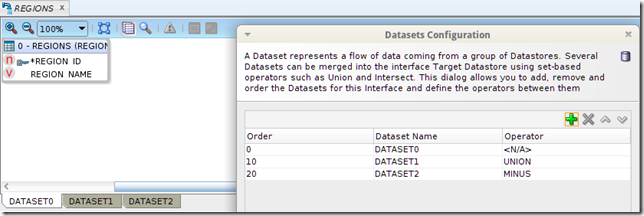
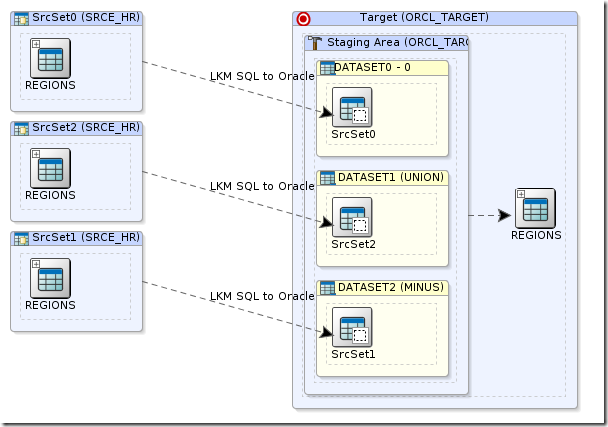
As you know, comments are always really welcome!
Good to see you here.




